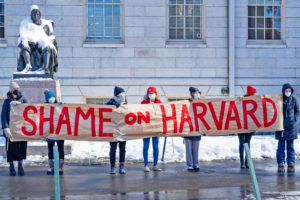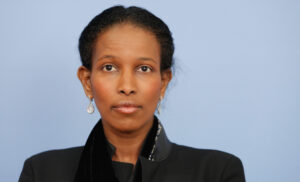What do Nasra Abukar Ali and Claudine Gay have in common? Or, for that matter, the Somali Ministry of Sports and the Harvard Corporation?
The answer is straightforward: both Ali and Gay came unprepared onto a major public stage, failed spectacularly in their respective roles, and massively embarrassed their respective organisations.
In early August, Ali had dreams of winning the 100-metre sprint for Somalia at the International University Sports Federation (FISU) Summer World University Games in China. Her performance was a fiasco. She looked confused at the starting blocks. Once the race started, she was so slow the cameraman struggled to keep her in the frame. As for the remainder of the race, one Forbes reporter noted: “Ali completed the 100-metre dash in 21.81 seconds, an embarrassing finish that’s almost double the winning 11.58-second time run by Brazil’s Gabriela Silva Mourão and nearly nine 9 seconds behind the second slowest time of 13.15 seconds by Turkmenistan’s Alsu Habibulina — leading many to ask questions about how a runner, who has never competed in a major event and appears to be untrained, was able to compete on such a large international stage.”
When she finally made it to the finish line, she did a little skip and a hop of triumph. A video of her sloth-like performance went viral on social media, along with demands for an explanation.
In early December, Claudine Gay, the president of Harvard was called to testify in Congress and asked whether calling for the genocide of Jews on campus violated Harvard university’s code of conduct. Gay delivered prepared remarks, priding herself and her institution on protecting free expression and, after a pitiful exercise in evasion, settling on the answer that calling for the genocide of Jews on campus depended on the context. She did the equivalent of Ali’s hop and skip with her smiles and smirks. The video clip of her abysmal performance went viral along with demands for an explanation.
Back in Somalia, the most pertinent questions in Ali’s case were obvious. Where was her record? How did she qualify? Where were the gatekeepers? The Somali Minister of Sports ordered an investigation, which found that a relative of Ali had ignored or lowered the standards of athletic selection for Ali. He sacked the woman in question and apologised publicly. This may not be the end of corruption in the government of Somalia, but it ended the story there within about 48 hours.
After Gay’s shambolic performance in Congress, similar questions were asked and answered by the public. The most obvious being: how did someone with a wafer-thin scholarly record of only 11 journal publications over a period of 26 years get to become the president of Harvard? Allegations and proof of nearly 50 instances of plagiarism followed. How on earth was this overlooked? Where were the gatekeepers?
The Harvard Corporation, the authority responsible for hiring the university’s president, chose a different path from the one taken by the Somali Minister of Sports. After a series of denials and statements of “unanimous support for the president”, threats against the New York Post and accusations of bigotry, they persuaded Gay to step down. Nevertheless, she continues to stay employed by Harvard as a tenured professor, retaining an annual salary of around $900,000. As for the university itself, the result is at least a billion dollars in withdrawn commitments from various donors, more congressional probing, a slump in applications from prospective students, and the trashing of its reputation.
All of which raises a peculiar question: if the Sports Ministry of a war-torn African country is able to show ethical clarity when objective standards of merit have been violated, what is holding back the leadership of America’s most renowned university? The answer, I suspect, lies in the three-letter acronym that has been menacing American and other Western institutions of higher education for the past decade: DEI, which supposedly stands for Diversity, Equity and Inclusion.
DEI is the programmatic implementation of an intolerant progressive agenda that views the existing structures of government, education, media, and industry as deeply unjust. It presents these institutions in the light of a hierarchical “intersectional” model of the oppressors and the oppressed. The ultimate oppressor is white, male, and straight. Blacks, women, gays and others are defined as their victims. To redress these past wrongs, DEI is supposed to design new structures of “positive” discrimination, or “affirmative action”.
This is how individuals such as Claudine Gay secured promotion to the commanding heights not just of the Ivy League, but of many other august institutions. Merit, qualifications, the ability to lead — all these criteria were cast aside as expressions of “systemic racism” and “white supremacy”.
The blame for this, of course, cannot be solely pinned on the individuals who have since benefited from DEI. As Gay ascended the ladder of academic preferment, her ambition was central but hardly sufficient. Rather, she did so with the complicity of a network of gatekeepers: the admissions offices of Princeton and Stanford; the peer reviewers who overlooked her plagiarism; the Harvard committees that promoted her through the various ranks of the professorship; and, finally, the members of the Harvard Corporation who deemed her the most suitable candidate for the position of president.
Thanks to their collaboration, and the fall-out following their exposure, the truth about DEI has been thrust into the mainstream. As an acronym, it still holds, but not in the way they intend. In reality, the D stands for the degradation of the standards once upheld at institutions such as Harvard; the E stands for their erasure; and the I stands not only for the indoctrination that follows, but also intimidation. Gay, after all, not only plagiarised the work of Carol Swain and other black academics. As dean and then as president, she set about destroying the careers of black scholars who choose to play by the rules of merit and academic integrity, notably Roland Fryer.
In a homogeneous society such as Somalia’s, identity politics is all about the bloodline. There, people in positions of authority try to give members of their extended family a leg up, whether or not they are qualified for the position in question. On rare occasions, the corruption might be caught on camera, as with the chubby girl who fancied she could win the 100-metre sprint. Normally, though, the favouring of family and friends continues until the resentment erupts into the next cycle of civil violence. There are no nice-sounding acronyms to cover up venality and, since everyone has the same skin colour and adheres to the same religion, immutable traits are irrelevant.
In a more sophisticated society such as the United States of America, corruption takes a different form. Here, identity politics assumes the role of bloodlines. Preferment is given to “women” or “women of colour”, so long as they follow strictly the progressive party line. But the net result is essentially the same. People without talent are rewarded and promoted. Those who would fare better in a meritocracy are left seething with resentment.
In her graceless attempt to portray her downfall as something more than the result of her exposure as a fraud, Claudine Gay alleged that there was “a broader war to unravel public faith in pillars of American society… Trusted institutions of all types — from public health agencies to news organisations — will continue to fall victim to coordinated attempts to undermine their legitimacy and ruin their leaders’ credibility.”
The reality is very different. Harvard — like the New York Times, which published her screed — has done the work of unravelling public faith all by itself. It has made a mockery of itself as surely as the Somali Sports Ministry did when it fielded a manifestly unqualified runner. The difference is that Harvard humiliated itself for the sake of an ideology, as opposed to plain nepotism. Until that ideology is extirpated not just from one university but from American education as a whole, the mafia of mediocrity will continue to march on — and produce many more Claudine Gays along the way.
Disclaimer
Some of the posts we share are controversial and we do not necessarily agree with them in the whole extend. Sometimes we agree with the content or part of it but we do not agree with the narration or language. Nevertheless we find them somehow interesting, valuable and/or informative or we share them, because we strongly believe in freedom of speech, free press and journalism. We strongly encourage you to have a critical approach to all the content, do your own research and analysis to build your own opinion.
We would be glad to have your feedback.
Source: UnHerd Read the original article here: https://unherd.com/




